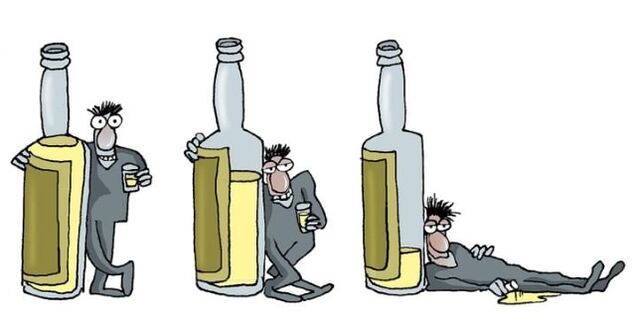According to statistics, men are twice as likely to experience alcohol dependence. Our society considers it very common to consume alcoholic beverages on a regular basis, although the consequences of alcohol on men are very sad for him and his family.
This opinion is certainly disastrous and should be reconsidered. Alcoholism is a serious disease that damages a person’s psyche and general health. It requires a comprehensive medical approach. As practice has shown, even beer causes stable alcoholism. It is with this disease that the disease begins, and then a person turns to strong alcohol.
External signs of alcoholism
Addictions form and develop gradually, step by step. It is possible to recognize the presence of alcoholism and its development by a number of signs of alcoholism in men. Psychologists and narcologists have developed the main symptoms by which one can recognize alcoholism that is just beginning:
- a strong craving for alcohol, a person finds the strangest excuse to justify his craving to drink;
- aggression against family members, friends, colleagues;
- lethargy and fatigue;
- speech disorders;
- disorders of the musculoskeletal system;
- familiarity in dealing with strangers;
- apathy, mood swings;
- deterioration of general health.
This is the first sign of alcoholism starting, which can last up to 10 years. It’s easy to miss them at this stage, as they often do. The woman did not pay attention to them. Thinking that a man relieves stress after work, try to escape the problem with a can of beer or a glass of brandy. Meanwhile, the disease did not stop and continued.
Causes of male alcoholism
The problem of male alcoholism is determined by the differences between the psychology of women and men. Male sex is less suited to changes in external circumstances and turns to alcohol as a way to distract from the problems and worries that befall him. Moreover, men often resist the persuasion to undergo rehabilitation, they believe that they are capable of coping on their own.
But this is not so - in addition to physical dependence, alcoholism brings about profound personality changes from the abuse of the first months. The external environment often over time consists of the same alcoholics, which also prevents healing.
Every second family in our country will face an alcohol problem in the future, or have faced it. This affects all family members without exception, especially children. In general, the reasons for the emergence of this dependence can be divided into three types:
- social;
- psychology;
- physiology.
They can appear individually or in combination. Social reasons include the presence of drinking friends in the environment. Social status plays a special role, as people with good jobs and higher education tend to face addiction problems. Especially necessary to indicate the presence of stress in the workplace, the level of well -being.
Psychological factors are:
- soul imbalance;
- inadequate level of self -control;
- poor motivation for professional and mental development;
- complex presence;
- lack of confidence.
There are a number of other factors that can cause alcoholism in a man. Here are the most common.
There are a group of other factors that cause persistent intoxication - factors of a physiological nature. These are metabolic disorders that lead to the rapid development of addiction and hereditary factors. If there was a case of alcoholism in the previous generation, chances are it will be relevant for the next generation. Someone thinks that he will not be addicted, and he can easily give up alcohol at any time. A similar phenomenon is characteristic of alcoholics at all levels of alcoholism.
You can recognize alcohol by his eyes and gaze. Ethanol has a negative effect on the eyes, they become "glassy" and tired. Over time, bags under the eyes and swelling appear. People like that look tired. This indirectly indicates the presence of disease in internal organs.
From people who regularly drink, often arises the smell of alcohol "fumes", which is difficult to confuse with others. People who get caught up in alcohol usually don’t maintain cleanliness, appearance, and don’t hesitate to wear wrinkled and dirty clothes.
Levels of alcoholism and their symptoms
There are several levels of alcoholism in men. There were only three of them, which came one after the other. The later treatment is started, the harder it is to achieve success - psychological dependence and social lifestyles stunt the progress of treatment.

First stage sign
In the early stages of the development of alcoholism, a gradual increase in the amount of alcohol consumed is characteristic. There are various reasons for this, people like that start looking for excuses to drink. At the same time, each time drunk more often. Relatives may hear reasons for this behavior:
- I want to rest.
- Others drank more than I did.
- Yes, I drink a lot, but I am not an alcoholic.
- I’m just tired at work and I want to relax.
If these expressions are accompanied by aggression, this is a clear sign of developing addiction. Also, this stage is characterized by other physiologically related symptoms:
- no gag reflex;
- more is needed to achieve the same level of toxicity;
- there is a blackout.
All of these manifestations lead to deterioration of general health, worsening attention span, and decreased efficiency. They appear more often during the transition to the next stage.
At this stage, it is necessary to start the treatment of alcoholism in a man - the earlier the stage, the more likely the result is successful. In the first stage, the intoxication is completely cured and the body, having recovered, is restored to its original state, because the organ has not had time to suffer and its function is not disturbed.
One cannot imagine one's life without alcohol. This is how he spends all his free time. Therefore, problems can arise in the workplace, as employees who often come in with a hangover work worse. As a result, conflicts with colleagues and management began. There are also many problems in family life.
Second level sign
In the second stage of alcoholism in men, other hallmarks appear. Symptoms of withdrawal or intoxication are more pronounced here. It consists of nausea, headache. Blackouts may occur. Sleep and digestion are often disturbed. The craving for alcohol is already unbearable. Alcoholics in the second stage can no longer stop drinking. He is the top priority on which all life revolves.
Also, this phase of the disease is characterized by a mental disorder - alcohol psychosis. This is expressed in unstable emotional states, frequent manifestations of aggression, inappropriate behavior, and unacceptable irregularities.
Third level sign
This is the last stage of alcoholism. At this stage, the patient needs to be hospitalized immediately to save his life. The complete deterioration of personality and moral values becomes indifferent. The main goal of an alcoholic is to get a new portion of alcohol and for that he can do anything, including breaking the law. It also happens:
- intoxication comes from small doses;
- drunk is very difficult;
- sleep depends on the amount drunk, as does food intake.
According to medical statistics, the average life expectancy of an alcoholic at this level does not exceed five years. Due to persistent body poisoning, the following symptoms may appear:
- intellectual decline;
- loss of speech or serious disturbances in it;
- high risk of stroke, heart attack, paralysis, severe liver and kidney dysfunction.

If these symptoms start to appear, you need to understand that the addiction is only growing. The basis for effective and successful treatment is the desire to get rid of the patient’s own addiction. The situation is complicated by the fact that alcoholics are often drunk and unable to make the right decisions. This makes it very difficult to dialogue with such people.
Beer alcoholism should be considered separately. Now this problem is on the rise in society. As a rule, many are convinced that beer should not cause alcoholism. Narcologists have different opinions on this - frequent beer consumption can lead to persistent alcoholism. He manifested himself to always drink this drink, and in large quantities. Gradually, the amount of intoxication increased. In this case, it is necessary to also sound the alarm and start the recovery process to get rid of this addiction.
Consequences of alcoholism in men
No matter how strong his body is, the consequences of alcoholism in men will not last long. They can be conditionally divided into two types - psychological and physiological. The latter can manifest itself in dysfunction of various body systems:
- Male impotence. Under the influence of alcohol, the hormonal background changes, testosterone production is disrupted.
- Digestive system problems. It can be gastritis, intestinal ulcers, stomach diseases.
- Stress problems. Alcohol damages the vascular system.
- Liver pathology. Frequent alcohol consumption causes cirrhosis and liver cancer.
- Weak immunity. The body loses its protective properties, infectious diseases often occur.
- Heart problem. The chances of a heart attack in alcoholic patients are several times higher than those who do not drink.
Alcoholism also affects the human psyche. These violations can be expressed in strange behaviors:
- A sense of persecution. It seems that someone is paying attention.
- The appearance of hallucinations. Under the influence of alcohol, the brain can create visual, auditory illusions.
- Encephalopathy. It is associated with poor blood circulation and nutrition of brain cells.
If such a phenomenon appears, you should immediately contact a competent psychologist who works with alcoholics. It is important to know that you can start treating alcoholism in a man at any level.
Recovery steps
- Step 1. Contact a specialized clinic
- Step 2. Persuade the addict to seek treatment
- Step 3. Detoxification (cleansing the body of toxins)
- Step 4. Comprehensive rehabilitation at the inpatient center
Only in the rehabilitation center, a man will be helped not only to get rid of physiological dependence, but will also be completely cured with the help of inpatient treatment, and will follow the first steps in life after recovery.
Of course, the sooner the help of a qualified narcologist is given, the faster and easier the process of getting rid of the disease will run. Therefore, if you have the slightest suspicion, immediately contact a specialist.
























